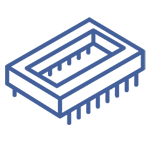Off-Board Power Supplies definition
Power supplies are devices which swap one type of electrical energy to another. While most computers have internal power supplies, many electronic devices use external ones. For example, some monitors and external hard drives have power supplies that reside outside the main unit. These power supplies are connected directly to the cable that plugs into the wall.
Power Supply
A power supply is an electrical device that provides electrical power to a load. A power supply's principal job is to convert electric current from a source to the proper voltage, current, and frequency for powering a load. Power supplies are sometimes referred to as electric power converters as a result of this. Some power supplies are stand-alone devices, while others are integrated into the load appliances they support. Power supply seen in desktop computers and consumer electronics devices are examples of the latter.
Types of Power Supplies
AC power supplies and DC power supplies are the two types of power supplies available. AC power supply or DC power supply may be used depending on the electric characteristics of the electrical gadget. And Power supplies types are available in the marketplace, such as Variable AC Power Supply, Unregulated Linear Power Supply(including Input Transformer, bleeder resistor, rectifier, step-down transformer, filter capacitor), Programmable Power Supply, Computer Power Supply, Regulated Linear Power Supply(contains Voltage Regulator, Series regulator, Shunt regulator), Switch Mode Power Supply (SMPS) (consists of regulator, series transistor, filter capacitor, transformer, rectifier), UPS (Uninterruptible Power Supply)(consists of conditioning circuitry, power sensing and a bank of rechargeable batteries) and DC Power Supply.
AC-DC Converter
AC-DC Converter is a type of Power Supplies, which can convert an alternating current input voltage (10 V to 766 VAC) to a direct current output voltage (-54.5 V to 400 VDC). And the AC-DC converter can be placed on-board or off-board. Off-board power sources have 1 to 10 outputs, whereas on-board power sources have 1 to 3 outputs.
DC-DC Converter
DC-DC converters are high-frequency power conversion circuits that smooth out switching noise into regulated DC voltages using high-frequency switching and inductors, transformers, and capacitors. Even when the input voltages and output currents change, closed feedback loops maintain a consistent voltage output.
Various electronic devices, such as ICs, operate at different voltages, necessitating the provision of a voltage for each device. Depending on the technique of conversion, DC-DC converters are also known as linear regulators or switching regulators.
A Buck Converter, also called Step-Down Converter, produces a lower voltage than the source, whereas a Boost Converter (Step-Up Converter) produces a greater voltage. And Boost-Buck Converter converts to a higher/lower voltage, but Negative Voltage/Inverting Converter supplies a negative voltage.












